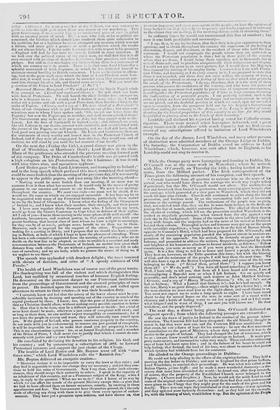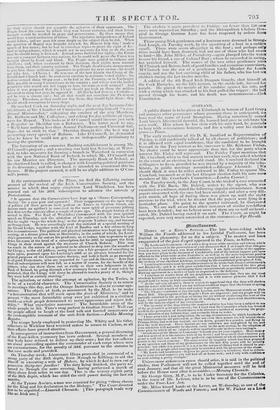While the Orange party were haranguing and feasting in Dublin,
Mr. O'Connell was at the same work in Waterford ; where he arrived,
with Mrs. O'Connell, on Thursday the 14th ; having landed at Dun- more, from the Milford packet. The Irish correspondent of the Times gives the following account of his reception, and first speech.
I-'Crowds hastened from all quarters to welcome him on the news of his arrival, and who would have drawn the carriage the whole way (eight miles) if permitted ; but this Mr. O'Connell would not allow. The multitudes on foot and horseback then formed in procession, many carrying green boughs after the carriage, which proceeded at a slow pace to Waterfoid, which they did not leach till near nine o'clock. Crowds still continued to arrive along the line of procession, and bonfires were lit on the surrounding hills and at favourable stations as the carriage passed. The enthusiasm of the people was so great,
that, not satisfied with this, they set fire to some furze hedges, in the fields ad-
joining the line of march, amidst universal cheers. The effect of these tires in the shades of evening, which fell ere the procession reached Waterford, is de.
scribed as singularly picturesque, when viewed from the city against a very
dark sky in the background. Some of the vessels in the liver had their rigging bong with lamps, and the majority hail on the news of his arrival at Dunmore hoisted their colours. Triumphal arches and festoons were got up on the quays with incredible expedition ; a large bonfire was lit at the foot of Barron Street, Opposite to Cummin's Hotel, which had been prepared for Mr. O'Connell ; and
nearly all the remaining population paraded the adjacent streets in anxious ex-
pectation of his approach. On his arrival, he instantly stepped op to the balcony, and proceeded to address the natives, frequently interrupted by cheers and laughter at his humorous allusions to former incidents, as follows—. Fellow
countrymen, you seem as merry as if you were going to beat the Beresfurds again. It is a fine thing to toil for so brave and honest a people as the Irish. They beat us, however, on the Tithe question this time; but with the blessing of God, and the assistance of the people, I will beat them the next time. We will also have a rap at the Rotten Corporations, and grind some of the fat ones
belonging to them. (" Grind them, grind them! ") 1 suppose you know them all ? (" We do, well.") You have all heard something of Repeal too? Well, I have only to tell you, that from all I have heard and seen, I am as thoroughgoing a Repealer now as when I left Ireland. Go on quietly and peaceably, and don't mind noticing such traitors as John Matthew Galway. (Groans, and a cry of "Henry Winston Barron.") Oh, ay ! he's not as bad as Galway. What a Luttrel that Galway is !—but he's had enough. By the law, Harry's no great things,—there might easily be got a better boy ; so at the next election we must send him to the right-about, and small blame to us. You must not expect me to make a long speech tonight. I have been tossed about to-day for several hours on the seas, in some sort of a vessel with a chimney and a kettle of boiling water to set her a-going ; and as I feel some- what fatigued and in want of sleep, I am stile you will excuse me.' Ile then withdrew, and the people dispersed." The next day, a dinner being given him, O'Connell delivered an eloquent speech ; from which the following passages are extracted— He saw the dawn of justice for Ireland in the conduct uf the present Admi- nistration. The Coercion Bill had been abrogated: the old Ministry thought to
renew it, but they were now out, and the Coercion Bill was annihilated. In
that event, he saw a dawn of hope fur his country : he saw the first movement of conciliation on the part of :Ministers, whose duty and interest it was to do
justice to the people of Ireland. They had changed the law of reversion, which
he as a lawyer, knew would be of infinite advantage to Ireland. It made pro- perty more secure, and increased its value very much. These and other enlivenivg rays of hope had burst upon him ; and in the fulness of his heart he could not help feeling, that Ireland, the land of his love, was about to receive that justice which tyranny had withheld from her for centuries.
He alluded to the Orange proceedings in Dublin— Ile could not help alluding to the efforts of the expiring faction. They held a meeting the day berore in Dublin ; and sent to England for that prime buffoon, Lord Winchilsea, to conduct their proceedings. He was what was called at the Italian Opera, primo bulb: and he made a most wonderful discovery—a dis- covery that must have astonished the world—be found out, after deep research, of course, that the property of the Established Church never belonged- to the Papists. (cheers and laughter.) Now, he would ask the noble Lord to read some of the original endowments, and lie would there find that such endowments were given to the Clergy that they might pray for the souls of the giver and .bit family. There was one topic they introduced at that meeting—it was agitation, and they agitated most furiously themselves : and, as they had set the example, he, with the blessing of God, would follow it up. But the agitation of the People would follow, and no man felt more deeply on the subject than he did. When nionou seemed theni SO per cent , to be had at the Treasury, or in Exchequer
should attack corruption in every shape. ,
Ile reached Cork on Saturday night, and the next doy harangued the SCOTLAND. inhabitants at the Chamber of Commetee ; professing himself "a con-





















 Previous page
Previous page